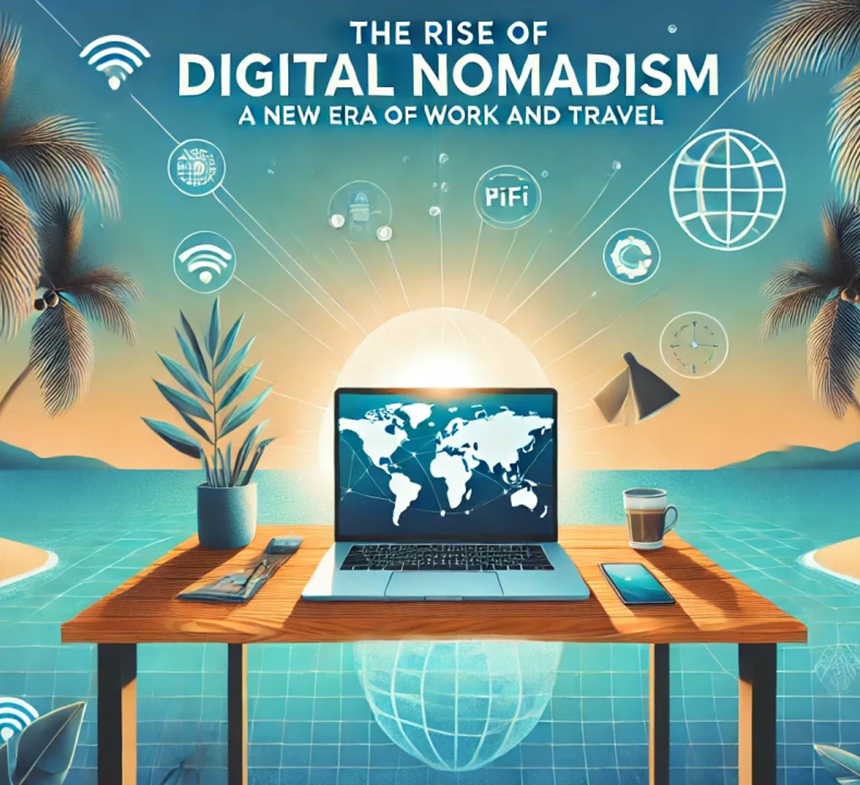It all started with a laptop, a dream, and a world that suddenly realized commuting in rush hour traffic wasn’t a necessity. The pandemic cracked open the door to remote work, and digital nomads kicked it wide open—straight onto a tropical beach with Wi-Fi and a coconut in hand. While some companies are nudging employees back to office cubicles, the digital nomad movement isn’t just here to stay—it’s evolving, expanding, and changing the way we think about work and life.
One billion people are expected to embrace the digital nomad lifestyle in the coming years, according to MBO Partners. But don’t assume this means everyone will be constantly country-hopping with a backpack. Some nomads travel full-time, others settle into long-term bases like Thailand, and some just take advantage of location freedom for part of the year. However they do it, their impact on work culture is undeniable. Here’s what we can expect in the future:
Once upon a time, people flocked to major cities like New York and London for career opportunities. Now? Digital nomads are rewriting that story, trading sky-high rents and subway delays for affordable beach towns and buzzing coworking spaces. While Bali, Chiang Mai, and Lisbon have long been digital nomad favorites, new hubs are emerging. Pattaya, for instance, is quickly becoming a go-to destination, offering a perfect mix of fast Wi-Fi, a growing nomad community, and a laid-back coastal lifestyle.
Rather than dispersing randomly, nomads cluster in places with reliable infrastructure, vibrant communities, and a work-life balance that doesn’t involve sitting in traffic for hours. Expect more countries to roll out the welcome mat with digital nomad-friendly visas and infrastructure tailored to remote workers.
Remote work policies were the first step, but companies are now facing a new challenge: employees who want to work from anywhere. As digital nomadism gains traction, companies will need to adjust tax and legal policies to accommodate globetrotting team members. More businesses will follow in the footsteps of remote-first pioneers, offering work-from-anywhere policies to attract top talent.
What does this mean for digital nomads? More freedom, fewer bureaucratic headaches, and a work culture where flexibility isn’t just a perk—it’s the norm. And for businesses, it means better retention and a diverse global workforce that doesn’t need to be tied to one location.
Countries have caught on to the fact that digital nomads bring cash without taking local jobs. From Portugal’s D7 visa to Thailand’s new Long-Term Resident Visa, more governments are rolling out the red carpet for location-independent workers. But there’s a catch: the financial entry bar is rising.
While early digital nomad visas had income requirements around $2,000/month, new ones in Asia are setting the bar higher—Thailand’s is at $80,000 per year, and South Korea and Japan aren’t far behind. Governments want well-off remote workers who contribute to the economy, which could push budget travelers out of the system. Expect more visa options, but with stricter requirements.
Pattaya’s coworking scene is already heating up, and it’s only going to get better. As digital nomads seek productive yet social work environments, coworking spaces are stepping up their game. Gone are the days of simple desk rentals—future coworking hubs will be community-driven, featuring networking events, wellness programs, and even high-tech media studios for podcasters and content creators.
Nomad-friendly spaces will also get smarter. Think AI-powered booking systems, VR meeting pods, and coworking locations tailored to specific industries. Whether you’re in need of a beachfront work setup, a quiet space for deep focus, or a networking hub filled with like-minded entrepreneurs, there will be a coworking space designed just for you.
The rise of digital nomads is already shaking up real estate. As more central apartments are converted into short-term rentals, locals in nomad hotspots face rising housing costs. Governments are trying to find the right balance—welcoming remote workers while ensuring locals aren’t priced out.
Meanwhile, in wealthier countries, homeownership may decline as more professionals opt for a flexible, location-independent lifestyle. Instead of investing in property, digital nomads might prioritize liquid assets, alternative investments, or simply living a more minimalist, experience-driven life.
Gone are the days of glorifying hustle culture. Studies show that digital nomadism boosts productivity and mental health, which is forcing traditional workplaces to rethink work-life balance. Expect companies to embrace more flexible hours, extended parental leave, and wellness-focused workspaces.
It’s no longer just about how many hours you clock in—it’s about results, well-being, and fulfillment. And as more people experience the benefits of remote work, outdated corporate structures will have no choice but to adapt.
The freedom of digital nomadism comes with a hidden challenge: loneliness. Constantly changing locations means leaving friends behind, and remote work can feel isolating without an in-person team. As this issue becomes more prominent, coworking spaces, online communities, and mental health initiatives will play a bigger role in keeping nomads connected and supported.
We’re likely to see more mental health resources, better networking opportunities, and even co-living arrangements that foster real, lasting friendships among location-independent professionals.
The rise of digital nomadism isn’t just a trend—it’s a cultural shift that’s redefining how we work, live, and connect with the world. As more people embrace location independence, expect industries to adapt, governments to take notice, and coworking spaces (especially in Pattaya!) to thrive.
So, whether you’re working from a sun-soaked café in Thailand, a coworking hub in Medellín, or a quiet spot in Tbilisi, one thing is clear: the future of work is here, and it’s looking pretty exciting.
Where do you see digital nomadism heading next?
